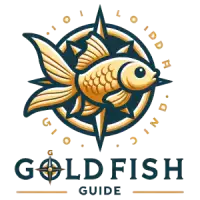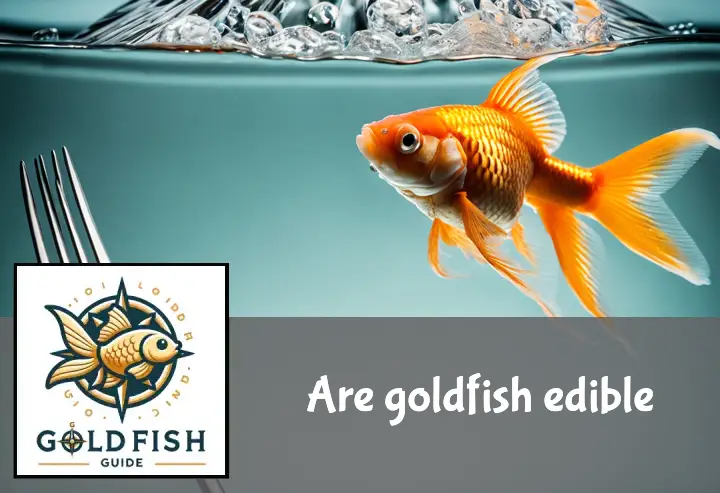Ever found yourself staring at your pet goldfish and wondered, “Are goldfish edible?” Well, let me save you from a potentially disastrous culinary adventure. Spoiler alert: It’s not a good idea!
Now, I know what you’re thinking. “But they’re fish! Fish are food!” True, but not all fish are created equal. Keep reading about ‘Are goldfish edible? Don’t even think about it!’
Key Takeaways
- Technically, goldfish are edible as they’re non-toxic, but it’s not recommended to eat them.
- Goldfish are often kept in conditions that aren’t suitable for human food standards, potentially leading to health risks if consumed.
- They may carry diseases and parasites harmful to humans.
- Ethical considerations also come into play, as goldfish are primarily pets and not a food source.
What are Goldfish?
Well, let’s dive into the world of goldfish. They’re not just your average pet fish. With their vibrant colors and graceful movements, they’ve got some serious charm. But there’s more to these little swimmers than meets the eye.
Origin and Purpose of Goldfish
Goldfish have a rich history that dates back centuries. Originally bred in China for their bright colors, goldfish were initially kept in ornamental ponds and water gardens. The original purpose of goldfish was to provide aesthetic value and symbolize good luck.
Over time, the evolution of goldfish use has seen them become popular household pets worldwide. They’ve also found their way into various cultural and scientific contexts, proving their versatility beyond being mere decorative elements.
Common Misconceptions about Goldfish
Now onto some juicy stuff – myths about goldfish! One common myth is that goldfish have a three-second memory span. Well, science says otherwise! In reality, these finned friends can remember things for up to five months.
Another misconception is that goldfish don’t grow bigger than their environment allows. This isn’t entirely true either! Their growth is influenced by factors like diet and health, not just tank size.
So there you have it – we’re debunking goldfish misconceptions, one fact at a time! And remember folks, despite what you might hear on the grapevine – are goldfish edible? Don’t even think about it!
Can You Eat Goldfish?
Well, if you’re wondering, “Are goldfish edible?”, the answer is technically yes. But before you start seasoning your pet’s tank mates, hold up! There are a few things to consider about goldfish consumption.
The Biological Composition of Goldfish
Goldfish aren’t your typical dinner plate fish. Their biological makeup isn’t quite what we look for in our seafood. They’re more bone than meat, which makes them less appetizing and harder to eat.
Moreover, they’re a type of carp and have a different taste and texture compared to popular edible fish species. So while it’s possible to eat them, they’re not exactly gourmet material.
Lastly, there’s the matter of their diet. Goldfish eat just about anything that fits in their mouths – including waste from other fish. This can affect the taste and safety of eating goldfish.
Potential Health Risks of Eating Goldfish
Now let’s talk about the potential health risks associated with eating goldfish. First off, they’re often kept in conditions that aren’t suitable for food production.
They may be exposed to chemicals or bacteria that could be harmful if ingested by humans. Plus, as mentioned earlier, their diet includes waste from other fish which could carry diseases.
Also, there’s the risk of choking on those tiny bones we mentioned earlier. And finally, let’s not forget about the psychological trauma you might inflict on any surviving tank mates! So all in all, it seems like eating goldfish is more trouble than it’s worth.
Why Shouldn’t You Eat Goldfish?
When it comes to the question, “Are goldfish edible?”, there’s more than just taste to consider. The ethics of eating goldfish, potential legal consequences, and environmental effects all play a part in why you should think twice.
Ethical Considerations
From an ethical standpoint, consuming goldfish is a big no-no. These little guys are often kept as pets, and eating pets is generally frowned upon. It raises serious questions about animal rights and pet welfare.
Moreover, the idea of eating something that’s been your companion might not sit well with many people. There are significant moral issues tied to the act of eating pets, especially when those pets are as beloved as goldfish.
Legal Implications in Some Countries
Legally speaking, chowing down on your finned friend could land you in hot water too. In some places, there are specific laws against goldfish consumption.
For instance, certain jurisdictions have strict regulations protecting pets from harm. Violating these can lead to hefty fines or even jail time. So before you consider making sushi out of your goldfish, remember there could be severe legal penalties for eating pets.
Environmental Impact
Lastly, let’s talk about Mother Earth. Overfishing is already a major issue worldwide; adding goldfish into the mix only exacerbates the problem. The environmental effects of overfishing can be devastating for our oceans’ ecosystems.
Furthermore, if we start seeing goldfish as food rather than pets, it could potentially disrupt local ecosystems. Imagine if everyone started fishing for their own pet goldfish! The ecological impact of eating goldfish would be far-reaching and damaging.
What Happens If You Eat a Goldfish?
So, you’re wondering about the consequences of eating goldfish? Well, let’s dive into the murky waters of this topic. The risks associated with goldfish consumption are not to be taken lightly. From immediate physical reactions to long-term health effects, there’s plenty to consider before you even think about making Nemo your next meal.
Immediate Physical Consequences
First off, the immediate reactions to eating goldfish can be quite unpleasant. We’re talking about potential stomach upset and nausea here. Not exactly a fun time, right?
But wait, there’s more! You could also experience allergic reactions. Yes, some folks are allergic to fish and might not even know it until they take that first bite. And trust us when we say that anaphylaxis is far from being a walk in the park.
Long-Term Health Effects
Now onto the long haul – the long-term health risks from eating goldfish. These aren’t just little blips on your health radar; we’re talking serious stuff here.
For starters, consuming raw or undercooked fish can lead to parasitic infections like tapeworms. And those buggers can stick around for years causing all sorts of problems.
And then there’s mercury poisoning – yes, even small fish like goldfish can accumulate mercury over time. Chronic exposure can lead to neurological issues and other nasty conditions.
So remember folks: Are goldfish edible? Technically yes, but it’s definitely not recommended!
Are There Any Safe Alternatives to Eating Goldfish?
So, you’ve asked yourself, “Are goldfish edible?” and we’ve answered with a resounding “No!” But don’t fret, fish lovers. There are plenty of safe alternatives that’ll tickle your taste buds without harming our finned friends.
Other Edible Fish Species
Let’s talk about some other edible fish species that are not just safe but downright delicious. First off, we have the mighty salmon, packed with omega-3 fatty acids and a great source of protein.
Next up is the versatile tuna, which can be enjoyed fresh or canned. It’s a staple in many cuisines around the world and for good reason!
Then there’s the oily goodness of mackerel and sardines. These small fishes are bursting with flavor and health benefits.
And let’s not forget about the freshwater champ – trout! This fish is a real catch (pun intended) with its delicate flavor and nutritional value.
Responsible Seafood Consumption
Now, while we’re on the topic of eating fish, it’s crucial to mention responsible seafood consumption. You see, overfishing is a big no-no as it threatens marine ecosystems.
That’s where sustainable fishing practices come into play. They ensure that we have enough fish for today without compromising future generations’ ability to enjoy these sea delicacies.
Another key aspect is seafood traceability. Knowing where your seafood comes from can help support local fishermen and promote ethical fishing practices.
Lastly, by choosing responsibly sourced seafood, you’re also contributing to marine conservation efforts. So remember folks, every bite counts!
To Wrap Up
So, we’ve swum around the idea of munching on our finned friends. The bottom line? Are goldfish edible? Technically yes, but it’s a big NO from an ethical and health perspective.
Let’s keep our goldfish in their tanks and not on our dinner plates. After all, they’re more fun to watch than to eat!



